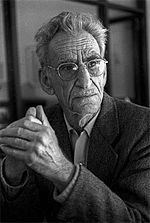
Read through the most famous quotes from George Oppen
A discrete series is a series of terms each of which is empirically derived, each one of which is empirically true. And this is the reason for the fragmentary character of those poems. ↗
The short-lived publishing venture managed to publish works by William Carlos Williams and Ezra Pound. George Oppen: Man and Poet (Man/Woman and Poet Series) (Man and Poet Series) National Poetry Foundation 1981. By 1942 Oppen was deferred from military service while working in the defense industry.
He returned to poetry — and to the United States — in 1958 and received the Pulitzer Prize in 1969. He abandoned poetry in the 1930s for political activism and later moved to Mexico to avoid the attentions of the House Un-American Activities Committee.
